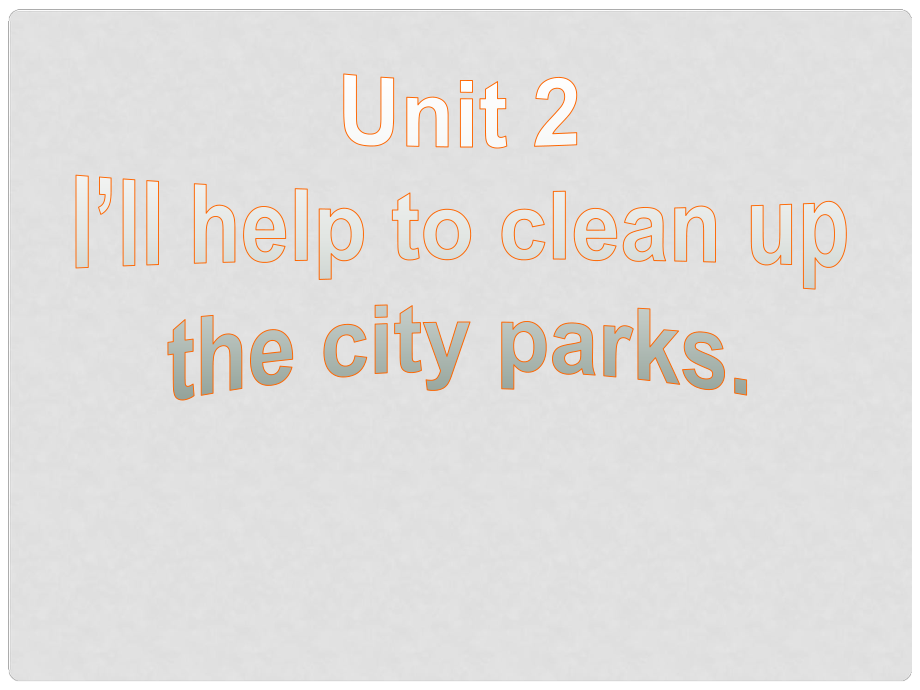《季八年級(jí)英語下冊(cè) Unit 2 I'll help to clean up the city parks Section A 課件1 (新版)人教新目標(biāo)版》由會(huì)員分享�����,可在線閱讀���,更多相關(guān)《季八年級(jí)英語下冊(cè) Unit 2 I'll help to clean up the city parks Section A 課件1 (新版)人教新目標(biāo)版(37頁珍藏版)》請(qǐng)?jiān)谘b配圖網(wǎng)上搜索�。
1����、 How could we help people?We could help clean up the parks.We could help sick people in the hospital.We could help plant trees. help the old peoplehelp give out food at the food bankcity n. 城市城市The library is in the north of the city. 圖書館在城市的北部。圖書館在城市的北部����。notice n. 公告牌;公告牌;通告�;布告通告;布告Please read the l
2�����、ist on the notice board. 請(qǐng)讀公告板上的名單�����。請(qǐng)讀公告板上的名單���。 Look around, we could see no sign of life. 環(huán)顧四圍�,我們看不出一點(diǎn)生命的跡象�。環(huán)顧四圍,我們看不出一點(diǎn)生命的跡象����。sign n. 標(biāo)志;信號(hào)標(biāo)志���;信號(hào)Many people volunteer to work on the farm.很多人志愿到農(nóng)場去工作����。很多人志愿到農(nóng)場去工作。volunteer v. 義務(wù)勞動(dòng)�,自愿做義務(wù)勞動(dòng)����,自愿做volunteer to do sth. 義務(wù)自愿做某事義務(wù)自愿做某事The students take turns to
3、clean up their classroom. 學(xué)生們輪流打掃教室����。學(xué)生們輪流打掃教室。clean up 打掃�����;清除打掃�;清除give out 分發(fā);散發(fā)分發(fā)���;散發(fā)Please help me give out these test papers.請(qǐng)幫我將這些試卷發(fā)下去�。請(qǐng)幫我將這些試卷發(fā)下去����。cheer v. 歡呼歡呼; 喝彩喝彩 Cheer up. The news isnt too bad. 振作起來,消息還不算太壞�。振作起來,消息還不算太壞。I dont feel lonely because I made new friends here. 我不覺得孤獨(dú)因?yàn)槲医涣诵屡笥?����。我不覺得
4���、孤獨(dú)因?yàn)槲医涣诵屡笥?。lonely adj. 孤獨(dú)的�����;寂寞的孤獨(dú)的����;寂寞的Jack used to be short, but now hes tall. 杰克過去很矮,但現(xiàn)在高了�。杰克過去很矮,但現(xiàn)在高了�����。used to 曾經(jīng)�����,曾經(jīng), 過去過去 Look at the ways you could help people in the picture. Then list other ways.1a1. _2. _3. _ _4. _Other ways you could help peopleHelp clean up the city park.Visit the old people
5�、 in the old peoples home. Help plant trees by the river.Help young kids to learn English. Listen and number the ways the boy and girl could help others. 1b_ The girl could visit the sick kids in the hospital to cheer them up. _ The boy could give out food at the food bank. _ The girl could volunteer
6、 in an after-school study program to teach kids._ The boy could help to clean up the city parks. 12341cPractice the conversation in the picture above. Then make other conversations using the information in 1b.I hope to work outside.You could help to clean up the city parks. A group of students are p
7���、lanning a City Park Clean-Up Day. Listen and check () the things they are going to do to tell people about it. 2a1. We need to _ _ _ a plan to tell people about the city park clean- up. 2. Clean-up Day is only two weeks from now. We cant _ _ making a plan. 3. We could _ _ signs. come up withput offp
8�、ut upListen again. Fill in the blanks. 2b4. Lets make some notices, too. Then Ill _ them _ after school. 5. We could each _ _ 10 students and ask them to come. give outcall up Make a conversation using the information in 2a and 2b.2cWe need to come up with a plan for the City Park Clean-Up Day.Lets
9�����、have lunch first. No, we need to start now. Clean-Up Day is only two weeks from now. Helen: Hi, Tom. Im making some plans to work in an old peoples home this summer.Tom: Really? I did that last summer!Helen: Oh, what did they ask you to help out with?Tom: Mmm things like reading the newspaper to the
10���、 old people,2dRead the conversation and answer the questions.or just talking to them. They told me stories about the past and how things used to be.Helen: That sounds interesting.Tom: Yeah, a lot of old people are lonely. We should listen to them and care for them.Helen: Youre right. I mean, were al
11、l going to be old one day, too.1. Wheres Helen going to work this summer? _ _2. What did Tom do to help the old people? _ _Shes going to work in an old peoples home. Reading the newspaper or just talking to the old people. Hi, Tom. Im making some plans to work in an old peoples home this summer. Rea
12�����、lly? I did that last summer! Role-play the conversation.1. They told me stories about the past and how things used to be. used to do sth. 過去常常做某事����;過去常常做某事; 表示表示過去習(xí)慣性�����、經(jīng)常性的動(dòng)作或狀態(tài),過去習(xí)慣性�����、經(jīng)常性的動(dòng)作或狀態(tài)�,暗指現(xiàn)在已經(jīng)不存在。暗指現(xiàn)在已經(jīng)不存在���。used無人稱和無人稱和時(shí)態(tài)的變化�。時(shí)態(tài)的變化�����。e.g. I used to go to the Youth Center. But I have no time now. 我過
13�����、去經(jīng)常去青少年中心�����,但現(xiàn)在我我過去經(jīng)常去青少年中心���,但現(xiàn)在我沒有時(shí)間了���。沒有時(shí)間了�����。 Grandparents used to tell us stories when we were very young. 在我們小時(shí)候祖父母常給我們講故事在我們小時(shí)候祖父母常給我們講故事 聽����。聽���。2. Yeah, a lot of old people are lonely. lonely adj. 孤獨(dú)的;寂寞的���。孤獨(dú)的���;寂寞的。指精指精 神上感神上感覺覺孤獨(dú)孤獨(dú)����、寂寞。���、寂寞�。e.g. The old man feels lonely, so he raises a dog. 那名老人覺得很孤獨(dú),因此他
14�、那名老人覺得很孤獨(dú),因此他 養(yǎng)了一只狗����。養(yǎng)了一只狗。 3. We need to come up with a plan for the City Park Clean-up Day. need 用實(shí)義動(dòng)詞�,用實(shí)義動(dòng)詞,“必要必要”�、“必需必需”。有人稱�、數(shù)和時(shí)態(tài)的變化,接名詞�����、代有人稱���、數(shù)和時(shí)態(tài)的變化�,接名詞���、代詞���、動(dòng)名詞或帶詞�、動(dòng)名詞或帶 to 的不定式作賓語����。的不定式作賓語。e.g. The man needs an English dictionary when he works. 這個(gè)人在工作時(shí)需要一本英語詞這個(gè)人在工作時(shí)需要一本英語詞典�。典。 Do you need to see
15���、him yourself? 你必需親自見他嗎����?你必需親自見他嗎�?clean up “打掃���;清理打掃�����;清理”���。如果在如果在clean 和和up間加個(gè)連字符號(hào)間加個(gè)連字符號(hào), 它就是名詞了它就是名詞了, 意意為為“掃除掃除”。e.g. You must give your classroom a good clean-up. 你必須對(duì)教室進(jìn)行徹底地打掃���。你必須對(duì)教室進(jìn)行徹底地打掃���。come up with 提出(觀點(diǎn)����,看法)����。提出(觀點(diǎn),看法)���。e.g. Hes come up with a great idea. 他想出了一個(gè)絕好的辦法���。他想出了一個(gè)絕好的辦法。 I came up with a
16�����、 better plan than that. 我提供了一個(gè)比那還好的計(jì)劃�����。我提供了一個(gè)比那還好的計(jì)劃。. Fill in the blanks.1. He helps _ the classroom. A. cleans up B. cleaning up C. clean up2. I took her to the concert to _. A. cheer up her B. cheer her up C. cheer she up 3. Lets help _ food at the food bank. A. to give out B. give up C. giving ou
17�、t CBA1. Youd better _ _ _ (想出想出) a better plan. 2. Who will _ _ _ (自愿回自愿回 答答) this question?3. You could put up a _ (布告布告) here. . Complete the e up withvolunteer to answernotice4. With no one to talk to. He _ very _ ( 感覺很孤獨(dú)感覺很孤獨(dú)).5. The life _ _ _ (曾經(jīng)是曾經(jīng)是) very interesting in my school days. lonelyfeltused to be Write three conversations about your discussions with your classmates. A: Id like to help the old. What could I do?B: You could give them medical service.
 季八年級(jí)英語下冊(cè) Unit 2 I'll help to clean up the city parks Section A 課件1 (新版)人教新目標(biāo)版
季八年級(jí)英語下冊(cè) Unit 2 I'll help to clean up the city parks Section A 課件1 (新版)人教新目標(biāo)版

